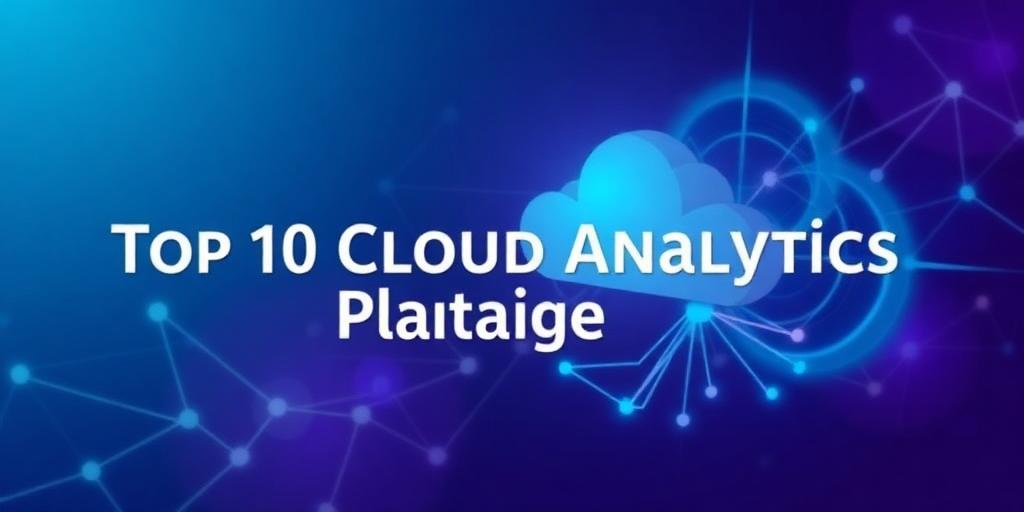The Top 10 Cloud Analytics Platforms: An Authoritative Guide
In the rapidly evolving digital landscape, data stands as the most valuable asset for organizations striving for competitive advantage. The ability to extract actionable insights from vast, complex datasets is no longer a luxury but a strategic imperative. Cloud analytics platforms have emerged as the foundational technology enabling this transformation, offering scalability, flexibility, and advanced processing capabilities far beyond traditional on-premise solutions. This authoritative guide delves into the leading cloud analytics platforms, providing an expert perspective on their unique strengths and why they stand out in a crowded market.
Understanding the nuances of these platforms is crucial for businesses aiming to optimize their data strategy, drive innovation, and make informed decisions. We will explore the key features and strategic advantages of the top contenders, including cloud data analytics tools, top cloud BI solutions, and enterprise cloud analytics offerings, to help you navigate the future of cloud analytics.
1. Amazon Web Services (AWS) Analytics Suite
AWS offers a comprehensive and deeply integrated suite of analytics services, making it a powerhouse for any data-driven enterprise. Key components include Amazon Redshift for petabyte-scale data warehousing, Amazon S3 for cost-effective data lake storage, Amazon Glue for ETL operations, Amazon Athena for serverless query, and Amazon QuickSight for business intelligence. AWS’s sheer breadth of services allows for highly customized, scalable, and secure analytical workflows, supporting everything from real-time streaming analytics to complex machine learning applications. Its pay-as-you-go model and global infrastructure make it a top choice for organizations seeking robust and flexible solutions.
2. Google Cloud Platform (GCP) Analytics
Google Cloud is renowned for its innovations in data warehousing and machine learning. At its core is Google BigQuery, a serverless, highly scalable, and cost-effective data warehouse that can query petabytes of data in seconds. Complementing BigQuery are services like Dataflow for unified stream and batch data processing, Dataproc for managed Apache Spark and Hadoop, and Looker for enterprise-grade business intelligence and data visualization. GCP’s emphasis on AI/ML integration and its cutting-edge infrastructure provide a powerful environment for advanced analytics and predictive modeling.
3. Microsoft Azure Analytics
Microsoft Azure provides a fully integrated ecosystem for data analytics, designed to seamlessly connect with existing Microsoft technologies. Azure Synapse Analytics is a unified analytics service that brings together enterprise data warehousing and Big Data analytics. It integrates with Azure Data Lake Storage, Azure Data Factory for ETL, and is deeply linked with Power BI for interactive dashboards and reporting. Azure’s strong focus on hybrid cloud scenarios, enterprise-grade security, and extensive developer tools makes it a compelling option for organizations already invested in the Microsoft ecosystem.
4. Snowflake
Snowflake has rapidly ascended as a leader in cloud data warehousing, distinguished by its unique architecture that separates storage and compute. This design allows for unparalleled flexibility and scalability, enabling users to scale resources up or down independently as needed. Snowflake’s Data Cloud facilitates secure data sharing across organizations, making it a critical platform for data collaboration. Its support for multiple cloud providers (AWS, Azure, GCP) and its user-friendly interface simplify complex data operations, making it a favorite for modern data strategies.
5. Databricks Lakehouse Platform
Databricks offers a pioneering Lakehouse Platform, which combines the best elements of data lakes and data warehouses. Built on Apache Spark, Databricks provides an open, unified platform for data engineering, machine learning, and data warehousing workloads. Its Delta Lake technology ensures data reliability and quality, while MLflow enables comprehensive machine learning lifecycle management. Databricks is particularly favored by data scientists and engineers for its powerful capabilities in advanced analytics and AI development.
6. Salesforce Tableau
While often recognized for CRM, Salesforce, through its acquisition of Tableau, offers a premier cloud-based business intelligence and visualization platform. Tableau Cloud (formerly Tableau Online) provides a fully hosted, self-service analytics solution that empowers users to create interactive dashboards, explore data, and share insights securely. Its intuitive drag-and-drop interface, robust data connectivity, and strong community support make it an indispensable tool for democratizing data across organizations and fostering data-driven cultures.
7. Oracle Analytics Cloud (OAC)
Oracle Analytics Cloud delivers a comprehensive, AI-powered platform for data preparation, visualization, enterprise reporting, and advanced analytics. Integrated with the Oracle Cloud Infrastructure (OCI) and capable of connecting to diverse data sources, OAC provides a unified environment for all analytical needs. Its self-service capabilities, augmented analytics features (such as natural language querying and machine learning-driven insights), and robust security make it a strong contender for enterprises leveraging Oracle’s broader technology stack.
8. SAP Analytics Cloud (SAC)
SAP Analytics Cloud is a single solution for business intelligence (BI), planning, and predictive analytics, running natively on SAP HANA Cloud. It integrates seamlessly with SAP applications (like S/4HANA, BW/4HANA) and non-SAP data sources, offering a unified view of organizational data. SAC's real-time capabilities, embedded AI and machine learning, and collaborative planning features enable organizations to move from insight to action swiftly, making it highly valuable for businesses deeply integrated into the SAP ecosystem.
9. IBM Cloud Pak for Data
IBM Cloud Pak for Data is a complete set of integrated data and AI services on an open, extensible cloud-native architecture. It provides a unified data fabric, data governance, data science, and machine learning capabilities. By offering a comprehensive platform that can run on any cloud or on-premises, IBM Cloud Pak for Data supports the full data lifecycle, from collection and organization to analysis and AI model deployment, addressing the complexities of hybrid cloud environments.
10. Qlik Cloud
Qlik Cloud is an end-to-end cloud platform for data integration and analytics. It combines Qlik Sense’s powerful associative engine and AI capabilities with robust data integration services, allowing users to discover hidden insights and generate actionable intelligence. With its unique associative model, Qlik Cloud enables users to explore data freely, without the limitations of query-based tools, making it highly effective for complex, multidimensional analysis and real-time operational insights.
Conclusion: Choosing Your Cloud Analytics Partner
The selection of a cloud analytics platform is a strategic decision that profoundly impacts an organization's ability to leverage its data assets. Each of the platforms discussed offers a distinct set of strengths, catering to different architectural preferences, existing technology investments, and specific analytical requirements. Whether your priority is raw processing power, advanced machine learning, seamless data sharing, or intuitive business intelligence, a solution exists within these top contenders. A thorough evaluation of your enterprise's unique needs, scalability demands, security protocols, and budget will guide you toward the optimal platform, ensuring your investment yields maximum strategic value and propels your business forward in the data-driven era.








